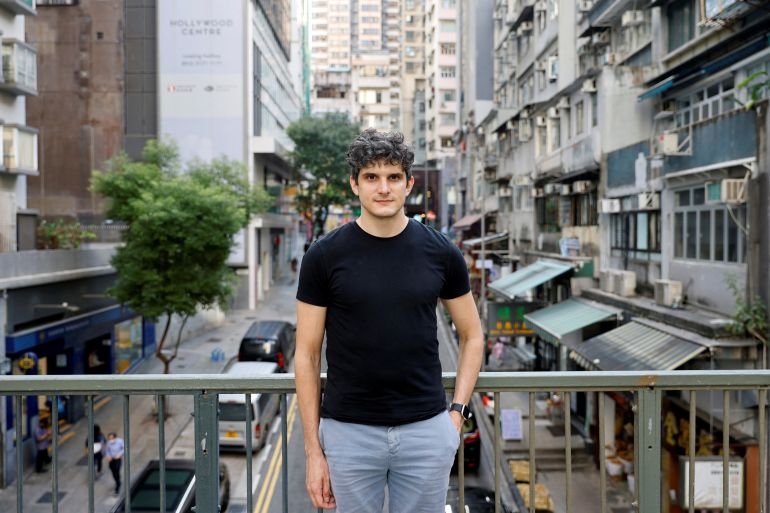US lawyer back in Hong Kong jail over police assault
Court dismisses Samuel Bickett’s appeal against his conviction for assaulting a plainclothes police officer during the 2019 protests.

An American corporate lawyer, convicted last July of striking a plainclothes police officer during the 2019 Hong Kong protests, is back in prison after his appeal was dismissed.
High Court Judge Esther Toh on Tuesday agreed with a lower court’s decision to convict Samuel Bickett, a former compliance lawyer with Bank of America in China.
Keep reading
list of 4 itemsLittle cheer for Year of the Tiger in Hong Kong as COVID bites
Locking down homes, Hong Kong takes COVID lesson from Beijing
As Omicron pushes the West to reopen, Asia hunkers down
Bickett, the ruling said, punched an officer and wrested away his baton after the officer tried to capture a turnstile jumper at a transit station. The judge agreed with a lower court magistrate that the officer’s actions had been reasonable and that Bickett’s were not.
The incident took place amid months-long protests that began over a proposed extradition bill to China but evolved into calls for greater democracy in the Chinese territory.
Bickett is resuming the four and a half month sentence that was handed down last year. He had served approximately six weeks before he was freed, pending appeal.
In a statement issued on his Twitter account, Bickett wrote that his actions to restrain the officer were reasonable, and therefore legal. He promised to appeal.
Toh agreed with the lower court that the officer, identified by Bickett as Yu Shu-sang, used reasonable force when he repeatedly struck Bickett as the two tangled. The conflict unfolded amid months-long democracy protests when police treatment of citizens became a major source of anger.
Toh reasoned that the officer in Bickett’s case was justified in striking with a baton because several police officers had been beaten at that time. She did not go into specifics.
Bickett has said in interviews that he grew concerned when he saw an older man use a baton to strike and press the neck of a younger man, who managed to escape.
When the officer raised his baton at Bickett, the American asked if the man was “popo”, slang for police. The officer initially said no, but changed his answer minutes later, as an angry crowd gathered. The two men grappled on the ground before Bickett punched the officer’s face and wrested the baton from his grasp.
In his appeal, Bickett claimed that the lower court erred when it allowed the police department to deny him its procedures manual, the Police General Orders. His lawyer argued at the trial that the materials would have allowed Bickett to question the decision by the officer to use his baton.
Hong Kong requires its officers to exhibit “self-discipline and exercise a high degree of restraint when dealing with the public”, and “not resort to the use of force unless such action is strictly necessary”, according to a memo on policing shared in 2019 during the protests.
In her ruling, Toh found that the police policy was “irrelevant…as these manuals had no legal force, as they were simply internal guidelines.”
Citizens have accused Hong Kong police in lawsuits of using inappropriate force to subdue, detain, and arrest residents in 2019.
A lower court rejected in 2020 a request by the Hong Kong Journalists’ Association for a judge to review the force’s procedures. The group claimed that officers had violated human rights through a pattern of “deliberately aggressive and obstructive police tactics, as well as unnecessary and excessive force”.

Police officers were issued expandable batons to execute “constabulary duties whilst off duty”, the Hong Kong Free Press reported in September 2019, citing a leaked police memo.
Icarus Wong, from the now disbanded Civil Rights Observer, which was monitoring the force, said there was a risk officers might not use the batons with restraint.
“You can imagine, if there is an off-duty police officer, with no warrant card or identification number, who attacks citizens with their baton. It would be impossible to hold them accountable,” Wong told the HKFP in the report.
Some defence lawyers have said that clients have been thwarted in their attempts to complain about ill-treatment by police.
Many police refused to wear their warrant cards during the 2019 demonstrations and the force will not release names of officers.
Conduct manuals guide police departments worldwide. Many research studies have concluded that clear communication and established firm protocols can limit faulty decision-making that can produce accidental and deadly actions.